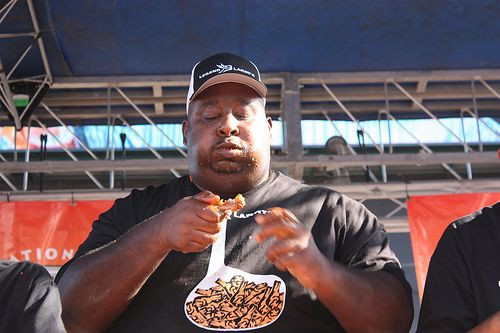Is Obesity A Social Disease? How The Fate Of Your Diet Is Often In Other People’s Hands

Though we’d like to think we have total oversight when it comes to the food we eat, the truth is we don’t. We human beings do a large part of our eating in the presence of others, and growing bodies of research are finding it’s this social aspect of our diets that compels us to adapt consumption to fit certain social norms. Now, a new study from the University of Liverpool raises the question: Is obesity a social disease?
Paying homage to the sexually transmitted infection (STI), this new classification of obesity may ruffle some feathers. Indeed, common wisdom often regards personal diet as just that — personal. No one forced you to order dessert, we think to ourselves, quietly stewing while someone larger than us complains he has to loosen his belt. The mindset prevailed when the American Medical Association (AMA) changed obesity from a risk factor to a disease in and of itself earlier this summer, and hordes of healthy Americans bemoaned the dissolving of weight’s social stigma. But are the obese themselves to blame?
I’ll Have What She’s Having
To investigate whether obesity should be classified as an STI, researchers pooled 15 studies from 11 publications. Eight of the studies found the impressions people had about food intake norms influenced how they ate, and the seven remaining studies found the actual food choices people made were largely affected by such norms. People who were in the company of healthier, more diet-conscious friends tended to eat healthier than they normally would. Likewise, people who ate a meal with those who were heavier and ate more, in turn consumed more themselves. Eating was also strongly tied to social identity, lead researcher Dr. Eric Robinson explains.
"It appears that in some contexts, conforming to informational eating norms may be a way of reinforcing identity to a social group, which is in line with social identity theory," Dr. Robinson said in a statement. "By this social identity account, if a person's sense of self is strongly guided by their identity as a member of their local community and that community is perceived to eat healthily, then that person would be hypothesized to eat healthily in order to maintain a consistent sense of social identity."
In this regard, healthy eating isn’t a product of personal goals, but rather of maintaining social standing. Rather than refuse our grandmother’s plea to try her cheesecake, and risk offending her, we indulge. If someone offers us a bite of their food, we accept. And more often than not, if everyone at the table orders dessert, we find ourselves scooping spoonfuls of sugar and fat into our own mouths.
Cookies Or Crackers?
What’s interesting about these brief breaks in will power is how unconscious of them we are when they happen. As Dr. Robinson points out, the subservience of personal goals to social norms happens automatically. It’s hardwired into us, he argues, to want to feel included. Any individual objective we set for ourselves is easily and effortlessly trumped by the need to fit in. If we want to stick to our goals, our best bet is to surround ourselves with people who share those goals.
"Norms influence behavior by altering the extent to which an individual perceives the behavior in question to be beneficial to them. Human behavior can be guided by a perceived group norm, even when people have little or no motivation to please other people," says Dr. Robinson. "Given that in some studies the participants did not believe that their behavior was influenced by the informational eating norms, it seems that participants may not have been consciously considering the norm information when making food choices."
Consider a study conducted earlier this year to illustrate the point. When people were asked to pick from one of two snacks, either healthy wheat crackers or fattening chocolate chip cookies, for themselves and a stranger they had just met, people tended to pick the same snack when that stranger was obese. When the stranger was a healthy weight, they chose the same snack only 30 percent of the time. Why? Participants explained they didn’t want to offend the obese person, either by giving them the cookies while they took the healthier option for themselves or giving them the crackers and keeping the cookies for themselves, because they could “afford” to eat an unhealthier treat.
"This suggests that if you are heading back to the buffet to cut a piece of pumpkin pie for your overweight uncle, you might also cut a larger piece than normal for yourself, so you don't hurt his feelings," Peggy Liu, a marketing doctoral student and lead author, stated in a news release.
Healthy Eating, The Default
Working with this understanding, governments should take sociability more into account when it comes to public policy and messaging, Dr. Robinson argues. Perhaps healthy eating should be built in more to the social landscape, rather than a point of purchase calorie count. Or, in the vein of a separate study, buffets should be oriented with the healthier options first, so that hungry diners choose fruit over sweets.
"Taking these points into consideration,” remarked Dr. Robinson, “the findings of the present review may have implications for the development of more effective public health campaigns to promote 'healthy eating.' Policies or messages that normalize healthy eating habits or reduce the prevalence of beliefs that lots of people eat unhealthily may have beneficial effects on public health."
Source: Robinson E, Thomas J, Aveyard P, Higgs S. What Everyone Else Is Eating: A Systematic Review and Meta-Analysis of the Effect of Informational Eating Norms on Eating Behavior. Journal of the Academy of Nutrition and Dietetics. 2013.



























